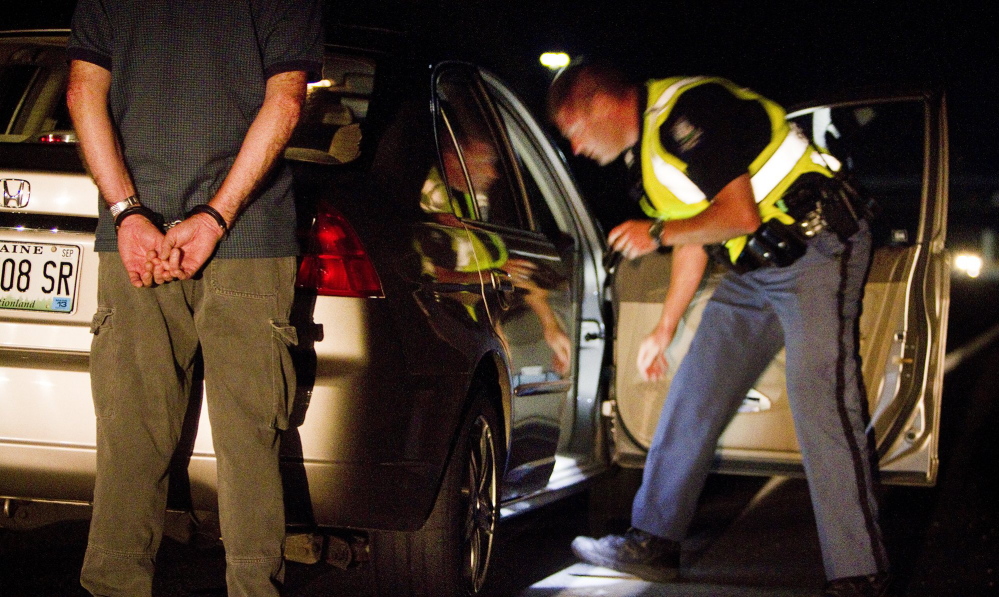Lawmakers consider expanding the time period for repeat OUI offenders from 10 to 15 years.
Lawmakers in Augusta began hashing over a proposal Monday that would extend the time frame during which drivers convicted of operating under the influence of alcohol could be charged with a repeat offense.
Under current Maine law, drivers are held accountable for prior OUI convictions within the past 10 years.
The bill that legislators are now considering, introduced by Rep. Timothy Marks, D-Pittston, would expand that period to 15 years.
“We should hold repeat offenders more accountable,” Marks said at a public hearing on his bill before the Legislature’s Criminal Justice and Public Safety Committee, on which he sits.
Marks, a retired state police trooper, said his bill was motivated partly in response to a fatal crash in Biddeford last August in which David Labonte, 56, is accused of driving his pickup truck into a family on bicycles, killing the father and seriously injuring the others. Labonte has a history of drunken-driving arrests.
Labonte, of Biddeford, faces an array of charges for the crash at 364 Elm St. in Biddeford, which killed Jamerico Elliott and badly injured his 17-month-old son, Lavarice Elliott. The boy’s mother, Melodie Brennan, suffered less serious injuries.
Police said Labonte’s blood-alcohol content was 0.15 to 0.17 percent, about twice the legal threshold for drunken driving. Because he already had four drunken-driving convictions, he was not allowed to have any alcohol in his system while driving.
Labonte’s case drew extra scrutiny because even though he had been convicted of drunken driving four times, none of the convictions was so recent that his license would be declared invalid. Labonte has pleaded not guilty and remains in jail while the case against him is pending.
An analysis by the Maine Sunday Telegram after the crash found that more than 5,000 people who have been stopped four or more times for drunken driving may still be getting behind the wheel. That number jumps to almost 15,000 for people who have at least three prior cases of operating under the influence, or OUI.
Marks said the intent of his bill is not to add to jail sentences or fines of people convicted of drunken driving but to encourage people convicted of OUI to get ignition interlock devices – systems installed in vehicles that detect a person’s blood-alcohol content and prevent the vehicle from being driven if the driver is intoxicated. Offenders who opt to use the device can get their licenses back after 30 days.
“The interlock device is the wave of the future in regard to drunken driving,” Marks said. “The beauty of this device is it guarantees the driver drives sober.”
Marks cited state data that showed that of the first 1,000 interlock devices installed in Maine, only 20 of those drivers reoffended.
All 50 states have ignition interlock laws of some sort. Fifteen states – Alaska, Arizona, Arkansas, Connecticut, Hawaii, Kansas, Louisiana, Nebraska, New Mexico, New York, Oregon, Tennessee, Utah, Virginia and Washington – require ignition interlocks after all drunken-driving offenses.
Laws also differ from state to state on how far back prior OUI convictions play into license suspensions. The period ranges from as little as five years in 13 states to no limit in four states – Vermont, Massachusetts, Colorado and New Mexico – according to a 2012 report by the National Conference of State Legislatures.
Rep. Mark Dion, D-Portland, said he is neither in favor of nor against the proposed legislation but expressed concern with what he called the “broad sweep” of the bill.
Dion, a defense attorney who was previously sheriff of Cumberland County, said the proposal would hold a serial drunken driver to the same standard as someone who may have been convicted once in college at age 18 and then exercised bad judgment at age 34 after having wine with dinner at a restaurant.
“How long is too long?” Dion asked.
The committee took no immediate action on the bill and will revisit it at a work session next week.
Scott Dolan can be contacted at 791-6304 or at:
sdolan@pressherald.com
Twitter: @scottddolan
Send questions/comments to the editors.



Comments are no longer available on this story